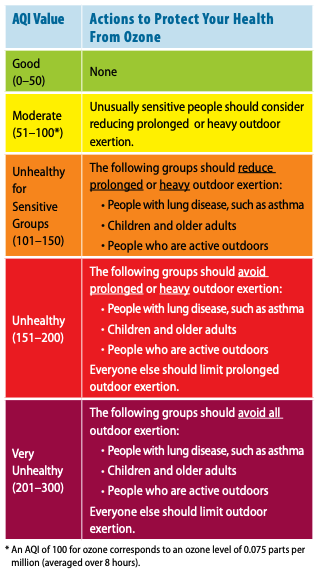Ozone Exposure and Your Health
2 minute read
Click play to listen to Ozone Exposure and Your Health.
Your plan for keeping yourself and your family healthy this summer likely includes:
- Eating healthy foods
- Staying cool and hydrated
- Planning ahead for travel
- Monitoring the weather forecast in your area
Part of the weather forecast that is important to understand, but is often overlooked, is the amount of ground-level ozone in your area. Stratospheric ozone provides a protective layer from the sun’s powerful radiation, but when ozone exists at ground level, it can be dangerous to human health. It forms when pollution from automobiles and industrial activity reacts with sunlight, meaning ozone reaches its highest levels of concentration on hot, sunny days.
Health Impacts of Ozone Exposure
Our understanding of ozone’s impact on human health continues to grow. It has been known to cause temporary symptoms like coughing and shortness of breath, and long-term impacts like damaged airways, more frequent asthma attacks, and premature death.
Recently, a study also linked ozone exposure to a rise in depression among children aged 9–13. Researchers found that those who reported higher levels of depression were more likely to live in areas that experienced higher levels of ozone exposure.
The exact cause of this association is not known, but researchers suggest that children may be more susceptible to it because they spend more time outdoors than adults. As for why increased ozone exposure might cause depression, researchers said it may be due to pollution and ozone causing an inflammatory response in the body, which has previously been linked to depression.
Another study linked excessive ozone exposure to cognitive impairment in older adults.
Controlling Ozone Exposure
Ozone exposure and the air pollution that helps create it can have a large impact on physical and mental health. That means it’s crucial to understand when you’re at risk of breathing in high concentrations of ozone, and how to avoid it.
AirNow.gov can tell you the quality of the air in your zip code, which includes a reading of current ozone levels.
The Environmental Protection Agency assembled the below chart to show how ozone concentrations impact humans and the actions you can take to ensure you and your family stay healthy.
The numbers will appear in the AirNow report, and can give you an idea of how much outdoor time is possible on any given day. While a couple of days of high exposure will likely cause only short-term symptoms, extended exposure over years can lead to larger problems that can take a real toll on your health.
Talk to your doctor if you have questions about specific medical conditions and how ozone exposure may impact them.

